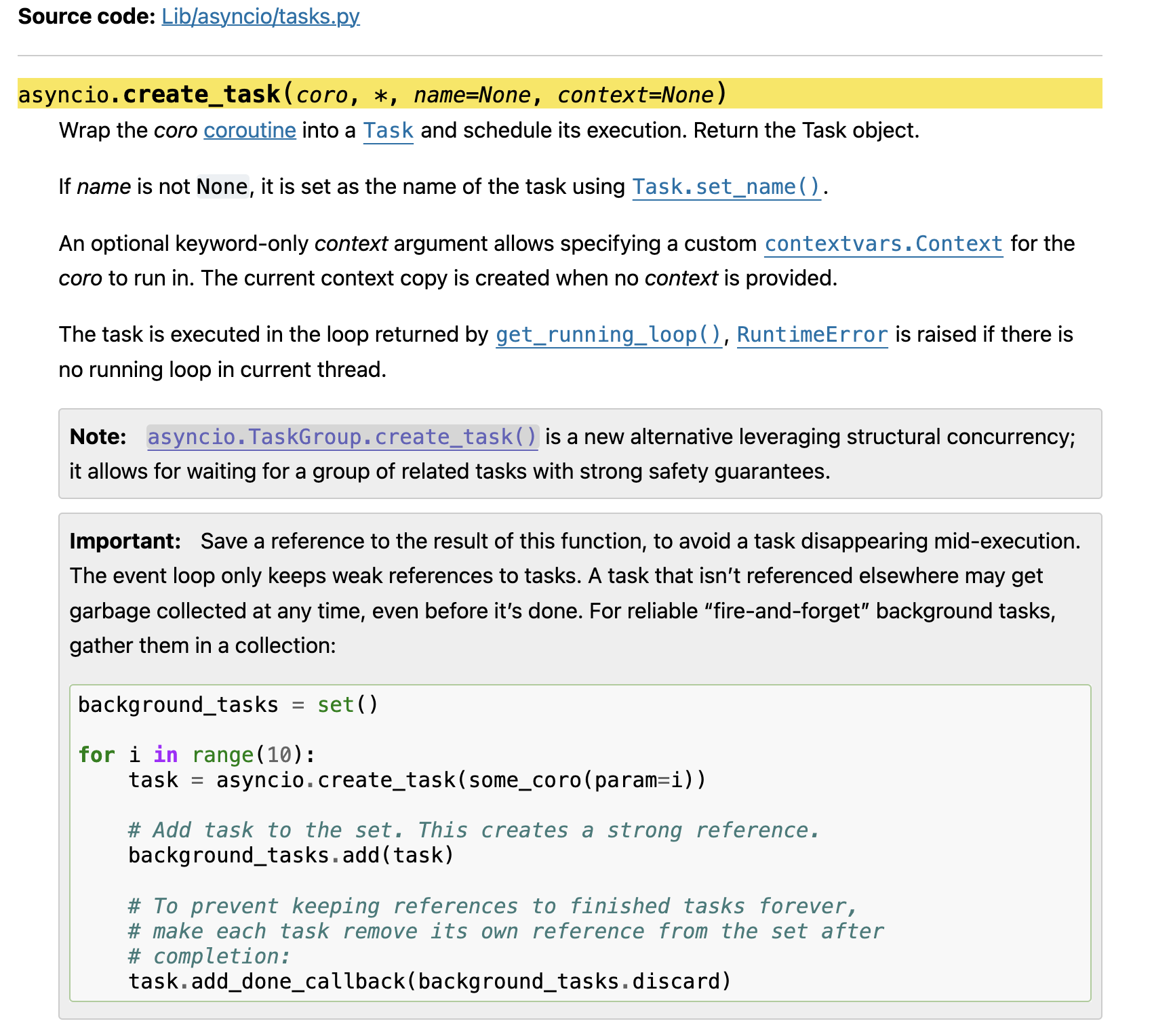Hey, did you know that unless you know exactly what you’re doing, you should never use asyncio.gather after manually creating async tasks via asyncio.create_task()?
This code,
async def my_function(val: int) -> int:
return val * 2
async def main() -> None:
task_1 = asyncio.create_task(my_function(1))
task_2 = asyncio.create_task(my_function(2))
task_3 = asyncio.create_task(my_function(3))
results = await asyncio.gather(*tasks)
print(results) # expect [2, 4, 6]
if __name__ == "__main__":
asyncio.run(main())is deeply unsafe. Let me cite the (in)famous article that alerted me to this problem, the Heisenbug lurking in your async code. Here’s also an excellent stack overflow answer that goes a bit more in depth. In short, due to python’s garbage collector, those task_* objects we created are weak references. Python’s garbage collector doesn’t understand that those task_* objects have a life after the asyncio.gather, and they may just be arbitrarily garbage collected by python, and never run.
Why does python do this? ¯\_(ツ)_/¯. I would like to have a cordial conversation to whoever designed it this way.
In fact, the asyncio docs for create_task have a warning for this:

Alright, fair, but I, like hundreds of millions developers, will skip text that’s in a grey box. It needs to have red scary text, maybe outlined in red, and it should also have a popup in the browser. Guido Van Rossum should mail each IP address that has ever downloaded python a hand-written letter warning them of this. That’s how serious this problem is.
The alternative solution, as the docs mention, is to use asyncio.TaskGroup. I actually love the asyncio.TaskGroup() abstraction, and it serves its purpose well.
async def my_function(val: int) -> int:
return val * 2
async def main() -> None:
async with asyncio.TaskGroup() as tg:
task_1 = tg.create_task(my_function(1))
task_2 = tg.create_task(my_function(2))
task_3 = tg.create_task(my_function(3))
results = [task_1.result(), task_2.result(), task_3.result()]
print(results) # expect [2, 4, 6]
if __name__ == "__main__":
asyncio.run(main())Pretty good! After the tg scope context manager has ended, we are guaranteed that each task has finished (or errored). Even though I have strong feelings about python not really having true scoping, we are able to consume the results of those tasks. But it still is a bit un-ergonomic. What if we want to create 1 million tasks, all with the same function, and get the results of all of them simultaneously?
async def my_function(val: int) -> int:
return val * 2
async def run_a_bunch_of_tasks(n: int) -> list[int]:
async with asyncio.TaskGroup() as tg:
tasks = [tg.create_task(my_function(i)) for i in range(n)]
return [task.result() for task in tasks]
async def main() -> None:
results = await run_a_bunch_of_tasks(1000000)
print(results) # expect [2, 4, 6, ..., 1999998, 2000000]
if __name__ == "__main__":
asyncio.run(main())Nicer, but now let’s really abstract it.
import asyncio
from collections.abc import Awaitable, Iterable
from typing import TypeVar
T = TypeVar("T") # for compatibility with python <=3.11
async def gather_tg(coros: *Awaitable[T]) -> list[T]:
async with asyncio.TaskGroup() as tg:
tasks: list[asyncio.Task] = [tg.create_task(coro) for coro in coros]
return [t.result() for t in tasks]Then, we can use it:
async def func1(val: int) -> int:
return val
async def func2(val: str) -> int:
return len(val)
async def func3(val: str) -> str:
return val
async def main() -> None:
results_1 = await gather_tg(*[func1(val) for val in range(5)])
print(results_1) # mypy thinks type is lint[int]
results_2 = await gather_tg(func1(1), func2("4"))
print(results_2) # mypy thinks type is lint[int]
results_3 = await gather_tg(func2("1"), func3("4"))
print(results_3) # mypy thinks type is lint[int | str]Interestingly, mypy throws an error on the [tg.create_task(coro) for coro in coros] block, claiming that Argument 1 to "create_task" of "TaskGroup" has incompatible type "Awaitable[T]"; expected "Coroutine[Any, Any, Any]. Mypy[arg-type]. But… it’s right.